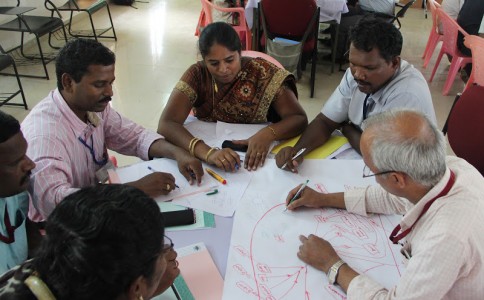“Global Convergence on a Finite Planet”. Conference in India: 21st-23rd February, 2013.
Venue: SCAD-Nirman- Francis Xavier Engineering College, Tirunelveli, Tamil Nadu
Recognizing that the sustainable development challenge is becoming increasingly acute, in the face of population growth, escalating consumption, a sharp rich-poor divide, environmental pressures, and climate change – the CONVERGE project focuses on how a transition to global equity for human society within the finite limits of our one planet (- Convergence) might inform EU policy. The recent context of the failures of the international SD processes at Rio to develop real ways forward indicate that we cannot simply slide SDGs into the system and expect radical change. From a Convergence perspective the way forward needs to be constructed by taking on the challenges of the Brundtland report and focussing on ’ Equity within Planetary Boundaries’. The issue of equity and development has been the reef on which international cooperation has foundered. Crucially, the discussions of the proposed Sustainable Development Goals (SDGs) are bringing environment and development agendas move closer together. This will greatly strengthen the ability of a more united movement to work for the radical changes necessary for all our futures.
Concept note and call for papers:
Key Overall Question: Can Convergence be a unifying frame for Environment and Development movements and international agreements?
Specifically: how can Convergence contribute to the development of effective and equitable international Sustainable Development Goals ?
Beyond 2015: The future context for developing Sustainability
While there is a need to continue to strive for a complete success in achieving MDGs, there is also an urgency to turn the vision for sustainable development into a set of goals for global action after 2015. (UN System Task Team, 2012:5)
Discussion has been taking place on the kinds of agreements that might be put in place post 2015. Into this mix of issues comes the RIO+20 conference where progress towards ‘Sustainable Development Goals’ proposed by Colombia is now regarded by many as one of the few positive outcomes. The opportunity to bring environmental and development goals together is one that many organisations and individuals are arguing should not be missed (Hazelwood, 2012; UN System Task Team, 2012). Crucially, the discussions of the proposed Sustainable Development Goals (SDGs) are bringing environment and development agendas move closer together. This will greatly strengthen the ability of a more united people’s Sustainability movement to work for the radical changes necessary for all our futures. How can the CONVERGE project tools and approaches contribute to this process?
With regard to ‘testing’ the CONVERGE concept we have two main questions:
- Can CONVERGE help broker more collaboration between those focussed on Environment and those focussed on Human Rights and Development?
- Can CONVERGE help to develop an internationally acceptable ethical guiding frame for sustainability policy that recognises the nested scales of the global system?
Building from the above and recognising the global justice and equity issues raised in difficult sustainability negotiations (eg Climate Change), the focus of this conference will be:
- Can a CONVERGENCE approach help to bridge the justice gap between developed and rapidly developing countries in the global sustainability arena?
- What political, economic , cultural spiritual and ethical traditions from rapidly developing countries might contribute to the CONVERGENCE ethical framing of policy?
- What case studies illustrating aspects of CONVERGENCE approaches might be drawn from rapidly developing countries?
- Could a CONVERGENCE approach address the historic environmental debt of developed countries, for example with regard to subsidies for sustainable technologies in rapidly developing countries?
- Can CONVERGENCE help to develop more globally cooperative approaches to managing existing and forthcoming resource depletion – including those of ‘ecosystem services’?
In the current context we would like to also consider:
- How we might bring CONVERGENCE approaches into the UN Sustainable Development Commission processes and perspectives?
- How we might develop a think tank to take forward these issues with international participation.
Indicative Agenda:
Day 1 – 21st Feb:
- Inauguration at SCAD-Nirman
- Keynote Speech / Panel Discussion (TBC)
- LUNCH
- Is Equity the key to solving policy deadlocks? International speakers – policy makers, politicians & NGOs from India; BRIC countries including China, Brazil; East Asia countries
- Launch of Convergence Alliance
- Keynote Conference Dinner: The UN Sustainable Development goals and Convergence – what synergies?
Day 2 – 22nd Feb: Papers
- ‘Can Convergence be a Unifying Frame for International Sustainability Agreements?’
- LUNCH
- Workshop groups: working on the Convergence approach and contribution to the SDGs with the Convergence Alliance. Developing Alliance document and position
- Presentation of work and discussion
- Keynote Conference Dinner: Cletus Babu, Chairman of the SCAD group of institutions will talk about SCAD -Nirman and the Day 3 visits
Day 3- 23rd Feb: focus on food Convergence; site visits
- Papers: multiple causes of global food crises – a systems account;
- Local and global accounts of food crisis; Supply chains and equity; Economics meets Earth System Science in the context of human needs and equity; Policy interventions
- LUNCH with site visits to inspirational initiative on food
- Field visit – presentation of team findings on food system in the community studied (WP3)
Registration Fee:
Free – Local Participants
717R (€10) – out of Tamil Nadu Indian participants
€150 for international participants – as a principle of the conference part of this fee goes towards subsidizing Indian participants.
€75 for international students
Travel and Accommodation
Participants to cover their own travel an accommodation costs. Hotels can be booked via the registration process.
Event registration – contact alice@schumacherinstitute.org.uk or sign up here globalconvergence.eventbrite.com



